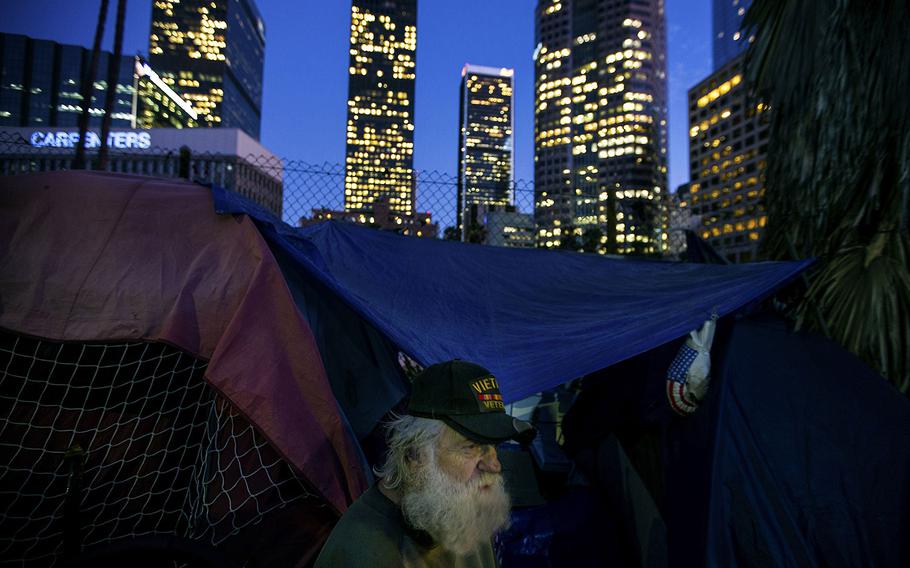
In a 2017 photo, a Vietnam War veteran is shown in his tent on South Beaudry Avenue in Los Angeles. (Francine Orr, Los Angeles Times/TNS)
Stars and Stripes is making stories on the coronavirus pandemic available free of charge. See other free reports here. Sign up for our daily coronavirus newsletter here. Please support our journalism with a subscription.
WASHINGTON – Advocates urged the Department of Veterans Affairs on Monday to immediately disburse millions of dollars included for homeless veterans in the sweeping $2 trillion stimulus bill Congress approved March 27.
The National Coalition for Homeless Veterans, a nonprofit that supports a large network of local, state and federal programs for homeless veterans, previously warned that homeless veterans were at high risk of contracting the coronavirus. The group sought $200 million from Congress to temporarily house homeless veterans in hotel rooms, secure more coronavirus tests for those who got sick and provide shelters with sanitation products.
Congress allocated $118 million in the stimulus bill for the homeless veteran population, said Kathryn Monet, the chief executive officer for the coalition. Though the population is in urgent need, the VA hasn’t yet released the funding or said how it will be used, Monet said.
In a letter to VA Secretary Robert Wilkie on Monday, Monet asked that he distribute the money “expeditiously” and provide guidance to local and state providers about how it should be spent.
“The longer specified guidance and funding distribution are delayed, the longer VA is putting homeless service providers in the impossible position of making life-or-death decisions, based on insufficient resource availability, for veterans experiencing homelessness,” she wrote.
Homeless shelters across the country are bearing the unexpected costs of disinfectant, masks, thermometers and sanitation products, as well as hazard pay for their employees. At the same time, the shelters, which get paid for filling their beds, are unable to house as many people in order to abide by social distancing guidelines.
“The combination of these two factors is creating unbearable financial strain on these organizations on the front lines of this fight,” Monet wrote.
The National Coalition for Homeless Veterans recommended the VA waive the caps on the amount of money that can go to providers who house homeless veterans and use some of the funds to provide space for homeless veterans to self-isolate if they contract the virus.
The group also is seeking funding for the government to train outreach staff to administer the tests to homeless veterans and provide protective gear for those staff members. Shelters should be supplied with disinfectant and sanitation products, and the VA should increase surveillance of the homeless veteran population to identify and track cases of the virus, Monet wrote.
In addition, Monet urged Wilkie to provide medical care to all homeless veterans, regardless of discharge status. About 15 percent of homeless veterans have other-than-honorable discharges that make them ineligible for some VA services.
Monet previously warned that progress in getting homeless veterans into permanent housing stopped as more than 50 public housing authorities across the country closed or shifted to remote work by the end of March. Veterans who received housing vouchers from the government but had not yet rented homes before the coronavirus pandemic are now unable to find housing. The coalition asked Monday that Wilkie work with the Department of Housing and Urban Development to find methods to keep the program running and get veterans into permanent housing.
Experts at the University of Pennsylvania, the University of California Los Angeles and Boston University published research March 20 that said the coronavirus has created a “severe and emergent health care crisis” for the homeless population that is “likely to wreak havoc” on this already vulnerable group.
The experts estimated the country would need an additional 400,000 shelter beds to house all homeless Americans and to provide for social distancing to help prevent the spread of the virus. They called on local, state and federal governments to work together immediately to shelter the homeless, to provide space for social distancing and to isolate the sick.
Though the research isn’t veteran-specific, Monet said it provided some insight into the extent of the problems that homeless veterans might face.
“We are in the middle of an emergency and veterans experiencing and at-risk of homelessness need your leadership now more than ever,” Monet wrote to Wilkie. “We thank you for your attention as we work collectively to lessen the impact that Covid-19 will have on veterans across the country.”
Wentling.nikki@stripes.com Twitter: @nikkiwentling